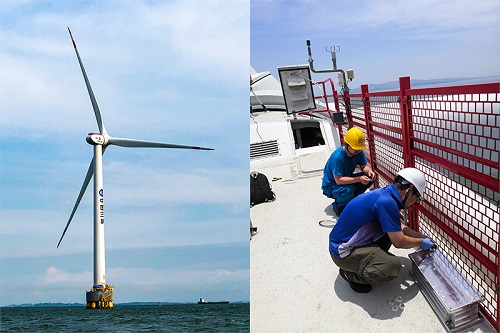CEI checks the environmental suitability of Asia’s largest offshore wind turbine
(prsgl-nj.com)
2020-09-10
The 10 MW offshore wind turbine (L) and the technical experts conducting the assessment (R) [Photo/prsgl-nj.com]
The State Key Laboratory of Environmental Adaptability of Industrial Products of China National Electric Apparatus Research Institute Co (CEI), a subsidiary of Sinomach, recently organized technical experts to evaluate the environmental adaptability of China’s first 10 megawatt (MW) offshore wind turbine at the Fuqing Xinghua Bay Offshore Wind Farm in Fuzhou, south China’s Fujian province.
The wind turbine, jointly developed by Dongfang Electric Corporation (DEC) and China Three Gorges Corporation, was put into operation on July 12, a milestone in the process of independent research and development in China. It is the largest offshore wind turbine in Asia and the second largest one in the world with rated single unit capacity.
During the field work, the technical experts monitored the environmental data of the wind turbine for such issues as internal corrosion, salt spray concentration and sedimentation, and assessed its electrical equipment as well as structural components. They also provided solutions to reduce the cost of anti-corrosion and optimize the operation and maintenance plan.
The data will also help improve and upgrade DEC’s 10MW model and provide support for different designs of corrosion protection for offshore wind turbines.
In recent years, China’s offshore wind power sector has witnessed rapid development, with its planned installed sea-based capacity reaching 10 million kilowatts. However the device environment failure problem is prominent. Improving environmental adaptability and ensuring long-term safe and stable operation has become a huge hindrance to the industry’s development.
The CEI’s laboratory has long researched environmental adaptability of coastal and offshore wind turbines and the full life cycle of offshore wind power. Its technical research results have been transformed into more than 10 national and industrial standards and become an important basis of design and testing in the industry.
The laboratory had completed the environmental adaptability monitoring and evaluation of many landmark offshore wind power projects before, including China’s first offshore test wind field and the world’s largest offshore wind farm. It has evaluated over 10 types of offshore wind power models and gathered rich field data and technical experience, contributing to the sustainable development of China’s offshore wind power capacity.

 R&D and Manufacture
R&D and Manufacture Project Contracting
Project Contracting Trade and Services
Trade and Services




